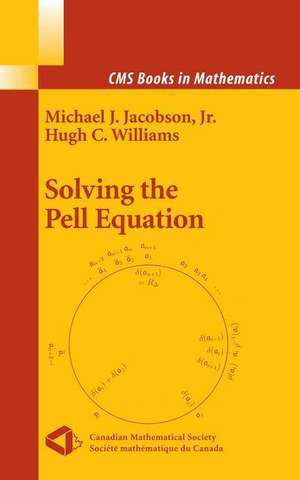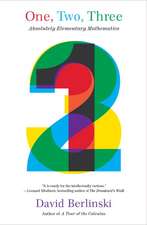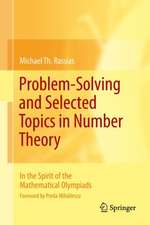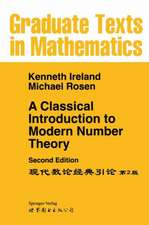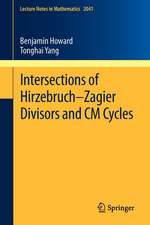Solving the Pell Equation: CMS Books in Mathematics
Autor Michael Jacobson, Hugh Williamsen Limba Engleză Hardback – 2 dec 2008
The authors provide a friendly introduction for advanced undergraduates to the delights of algebraic number theory via Pell’s Equation. The only prerequisites are a basic knowledge of elementary number theory and abstract algebra. There are also numerous references and notes for those who wish to follow up on various topics.
| Toate formatele și edițiile | Preț | Express |
|---|---|---|
| Paperback (1) | 481.62 lei 6-8 săpt. | |
| Springer – 6 dec 2010 | 481.62 lei 6-8 săpt. | |
| Hardback (1) | 486.86 lei 6-8 săpt. | |
| Springer – 2 dec 2008 | 486.86 lei 6-8 săpt. |
Din seria CMS Books in Mathematics
- 20%
 Preț: 942.90 lei
Preț: 942.90 lei - 17%
 Preț: 429.86 lei
Preț: 429.86 lei - 15%
 Preț: 787.71 lei
Preț: 787.71 lei -
 Preț: 322.22 lei
Preț: 322.22 lei - 18%
 Preț: 780.97 lei
Preț: 780.97 lei - 15%
 Preț: 690.59 lei
Preț: 690.59 lei -
 Preț: 399.29 lei
Preț: 399.29 lei -
 Preț: 386.00 lei
Preț: 386.00 lei - 15%
 Preț: 644.30 lei
Preț: 644.30 lei -
 Preț: 368.24 lei
Preț: 368.24 lei -
 Preț: 392.37 lei
Preț: 392.37 lei - 18%
 Preț: 784.92 lei
Preț: 784.92 lei -
 Preț: 493.34 lei
Preț: 493.34 lei - 15%
 Preț: 443.91 lei
Preț: 443.91 lei - 15%
 Preț: 641.20 lei
Preț: 641.20 lei - 24%
 Preț: 698.99 lei
Preț: 698.99 lei -
 Preț: 389.88 lei
Preț: 389.88 lei - 15%
 Preț: 537.23 lei
Preț: 537.23 lei -
 Preț: 400.10 lei
Preț: 400.10 lei - 20%
 Preț: 547.86 lei
Preț: 547.86 lei - 15%
 Preț: 524.88 lei
Preț: 524.88 lei -
 Preț: 395.85 lei
Preț: 395.85 lei -
 Preț: 399.29 lei
Preț: 399.29 lei -
 Preț: 397.01 lei
Preț: 397.01 lei -
 Preț: 391.79 lei
Preț: 391.79 lei -
 Preț: 483.05 lei
Preț: 483.05 lei -
 Preț: 497.00 lei
Preț: 497.00 lei - 15%
 Preț: 645.28 lei
Preț: 645.28 lei -
 Preț: 356.60 lei
Preț: 356.60 lei - 15%
 Preț: 639.41 lei
Preț: 639.41 lei - 15%
 Preț: 648.56 lei
Preț: 648.56 lei -
 Preț: 492.37 lei
Preț: 492.37 lei - 15%
 Preț: 478.05 lei
Preț: 478.05 lei -
 Preț: 389.49 lei
Preț: 389.49 lei
Preț: 486.86 lei
Preț vechi: 572.78 lei
-15% Nou
Puncte Express: 730
Preț estimativ în valută:
93.17€ • 96.12$ • 78.86£
93.17€ • 96.12$ • 78.86£
Carte tipărită la comandă
Livrare economică 05-19 martie
Preluare comenzi: 021 569.72.76
Specificații
ISBN-13: 9780387849225
ISBN-10: 038784922X
Pagini: 495
Ilustrații: XX, 495 p.
Dimensiuni: 155 x 235 x 30 mm
Greutate: 0.86 kg
Ediția:2009
Editura: Springer
Colecția Springer
Seria CMS Books in Mathematics
Locul publicării:New York, NY, United States
ISBN-10: 038784922X
Pagini: 495
Ilustrații: XX, 495 p.
Dimensiuni: 155 x 235 x 30 mm
Greutate: 0.86 kg
Ediția:2009
Editura: Springer
Colecția Springer
Seria CMS Books in Mathematics
Locul publicării:New York, NY, United States
Public țintă
Professional/practitionerCuprins
Early History of the Pell Equation.- Continued Fractions.- Quadratic Number Fields.- Ideals and Continued Fractions.- Some Special Pell Equations.- The Ideal Class Group.- The Analytic Class Number Formula.- Some Additional Analytic Results.- Some Computational Techniques.- (f, p) Representations of -ideals.- Compact Representations.- The Subexponential Method.- Applications to Cryptography.- Unconditional Verification of the Regulator and the Class Number.- Principal Ideal Testing in .- Conclusion.
Recenzii
From the reviews:
"‘Solving the Pell Equation’ is a … monograph that offers encyclopedic in-depth coverage of its topic. … The book is very well-written and filled with many interesting asides. … As one of the book’s stated goals is to provide ‘a relatively gentle introduction for senior undergraduates,’ a much larger set of examples … increase the number of students at every level who could profitably read this text. … I highly recommend the book to anyone with an interest in Pell’s equation and its modern study." (Thomas Hagedorn, The Mathematical Association of America, July, 2009)
"This new book on the Pell equation, eagerly anticipated by the mathematical community and written by two active contributers to the field of computational number theory in general and to Pell’s equation in particular, exposes the ongoing interaction between modern computational number theory and practice in a way that is pleasant to read and to study, and that is readily accessible to conscientious undergraduate students. … this book is highly recommended." (Robert Juricevic, Mathematical Reviews, Issue 2009 i)
“Pell’s equation is best known for the misattribution by Euler of a method of solution to John Pell. … This work will be valuable for a comprehensive mathematics library to give strong mathematics students a motivated, deep introduction to advanced number theory. Summing Up: Recommended. Lower- and upper-division undergraduates.” (J. McCleary, Choice, Vol. 47 (5), January, 2010)
"‘Solving the Pell Equation’ is a … monograph that offers encyclopedic in-depth coverage of its topic. … The book is very well-written and filled with many interesting asides. … As one of the book’s stated goals is to provide ‘a relatively gentle introduction for senior undergraduates,’ a much larger set of examples … increase the number of students at every level who could profitably read this text. … I highly recommend the book to anyone with an interest in Pell’s equation and its modern study." (Thomas Hagedorn, The Mathematical Association of America, July, 2009)
"This new book on the Pell equation, eagerly anticipated by the mathematical community and written by two active contributers to the field of computational number theory in general and to Pell’s equation in particular, exposes the ongoing interaction between modern computational number theory and practice in a way that is pleasant to read and to study, and that is readily accessible to conscientious undergraduate students. … this book is highly recommended." (Robert Juricevic, Mathematical Reviews, Issue 2009 i)
“Pell’s equation is best known for the misattribution by Euler of a method of solution to John Pell. … This work will be valuable for a comprehensive mathematics library to give strong mathematics students a motivated, deep introduction to advanced number theory. Summing Up: Recommended. Lower- and upper-division undergraduates.” (J. McCleary, Choice, Vol. 47 (5), January, 2010)
Textul de pe ultima copertă
Pell's equation is a very simple, yet fundamental Diophantine equation which is believed to have been known to mathematicians for over 2000 years. Because of its popularity, the Pell equation is often discussed in textbooks and recreational books concerning elementary number theory, but usually not in much depth. This book provides a modern and deeper approach to the problem of solving the Pell equation. The main component of this will be computational techniques, but in the process of deriving these it will be necessary to develop the corresponding theory.
One objective of this book is to provide a less intimidating introduction for senior undergraduates and others with the same level of preparedness to the delights of algebraic number theory through the medium of a mathematical object that has fascinated people since the time of Archimedes. To achieve this, this work is made accessible to anyone with some knowledge of elementary number theory and abstract algebra. Many references and notes are provided for those who wish to follow up on various topics, and the authors also describe some rather surprising applications to cryptography.
The intended audience is number theorists, both professional and amateur, and students, but we wish to emphasize that this is not intended to be a textbook; its focus is much too narrow for that. It could, however be used as supplementary reading for students enrolled in a second course in number theory.
One objective of this book is to provide a less intimidating introduction for senior undergraduates and others with the same level of preparedness to the delights of algebraic number theory through the medium of a mathematical object that has fascinated people since the time of Archimedes. To achieve this, this work is made accessible to anyone with some knowledge of elementary number theory and abstract algebra. Many references and notes are provided for those who wish to follow up on various topics, and the authors also describe some rather surprising applications to cryptography.
The intended audience is number theorists, both professional and amateur, and students, but we wish to emphasize that this is not intended to be a textbook; its focus is much too narrow for that. It could, however be used as supplementary reading for students enrolled in a second course in number theory.
Caracteristici
Describes modern (and surprising) applications to cryptography Includes the most recent advances, with a deeper approach than any other book Hugh Williams is Canada’s most famous computational number theorist who has published close to 200 articles in top journals Michael Jacobson is the known expert on subexponential methods, and a former student of Hugh Williams Both authors are known as outstanding expositors Includes supplementary material: sn.pub/extras
